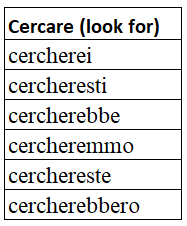What is the Present Conditional and when should you use it in Italian?
The condizionale presente is one of the most frequently used tenses in conversation, together with presente, passato prossimo and imperfetto. It is the equivalent of the construction would + verb, and it has two tenses only: the present and the past. In this article, you’ll learn how to conjugate and use the present conditional (condizionale presente).
Generally speaking, it’s a tense which is used in independent clauses to express, in the present or in the future:
- a wish or an intention
Vorrei ordinare un bicchere d’acqua. I would like to order a glass of water. - a personal opinion
Secondo me, le persone dovrebbero guidare più piano. In my opinion, people should drive slower. - an invitation
Vorresti venire al cinema con me? Would you like to come to the cinema with me? - a polite request
Potrei avere un bicchiere d’acqua? Could I have a glass of water?
How to form the present conditional in Italian
In English, you make the present conditional tense by putting would before the verb. In Italian, it’s the ending that changes.
The condizionale in Italian is formed by dropping the -e of the infinitive and by adding the following endings:
Condizionale presente of irregular verbs
Regular verbs all follow the pattern above, whereas irregular verbs, in particular essere (to be), avere (to have), and the modal verbs (dovere, potere, volere) follow a slightly different pattern, for example:
Some exceptions
Verbs ending in -care/gare take an h in the present conditional:
Verbs ending in -ciare/-giare drop the i in the present conditional
Present conditional with the hypothetical period
The condizionale presente uses to form the so called hypotetical period of the second type (periodo ipotetico della possibilità), to refer to something that might happen, or that is improbable, but possible. In the hypothetical period, the dependant clause is formed with congiuntivo imperfetto, whereas the main clause is formed with the condizionale presente.
Se fossi in te, non andrei a quella festa. If I were you (dependant clause), I wouldn’t go to that party (main clause).
More examples using the Italian present conditional
- Mi piacerebbe comprare un’auto nuova. I would like to buy a new car.
- Mi aiuteresti a portare questa valigia? Would you help me carry this suitcase?
- Se fossi ricco, andrei in vacanza ogni mese. If I was rich, I would go on holiday every month.
- Dovresti fare più attenzione. You should be more careful.
“One of the most important areas we can develop as professionals is competence in accessing and sharing knowledge”













